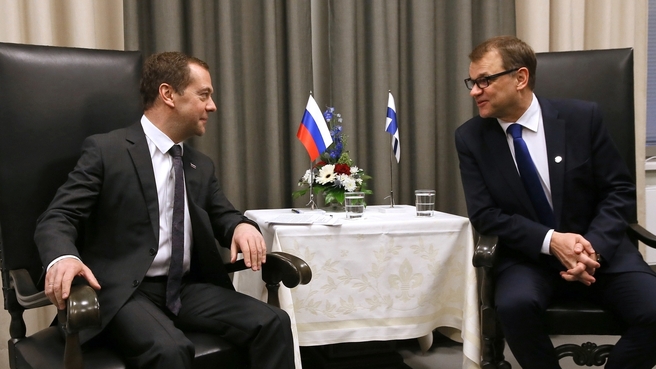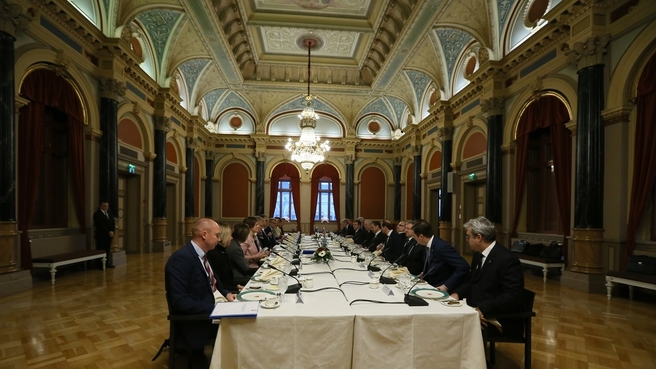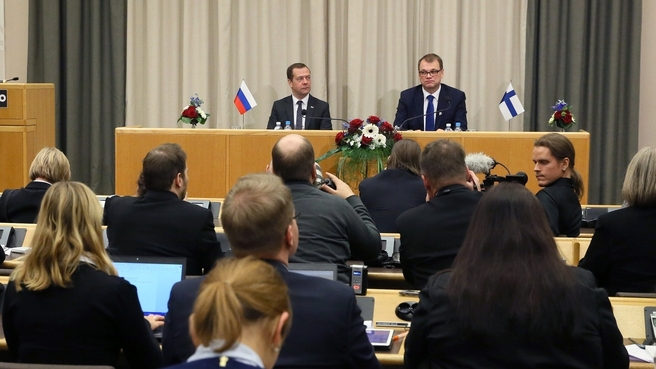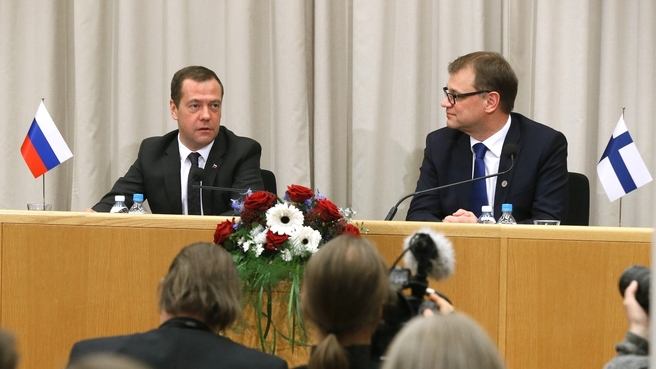The prime ministers discussed the current issues in Russian-Finnish cooperation in trade and the economy, including progress in bilateral projects in investment, infrastructure, energy, transport, the environment, culture and the humanitarian area, as well as the status of the country’s inter-regional and cross-border ties.
Dmitry Medvedev’s meeting with Prime Minister of Finland Juha Sipila
Joint news conference by Dmitry Medvedev and Prime Minister of Finland Juha Sipila
Juha Sipila (via interpreter): We had very good, constructive talks on the current issues of bilateral cooperation. The Russian Federation remains an important trade partner for Finland, even though trade has gone down as compared to the peak figures of the past years.
The intergovernmental commission on economic cooperation met in late November after a three-year break. It was a successful meeting, and we reached an agreement on the purchase of the House of Finland in St Petersburg.
The downward trend in the number of Russian tourists coming to Finland has been reversed, even if the growth is modest.
The planned construction of a nuclear power station in Pyhäjoki is of special interest.
We had a productive conversation on environmental issues. The Russian Federation proclaimed 2017 as the Year of the Environment. Finland takes a very serious approach to fulfilling its commitments under the Paris Agreement to address climate change, and there are many new opportunities for cooperation in this area for our countries’ companies.
We discussed the Arctic as well. In particular, we touched on the issue of black soot emissions and talked about how important it is to reduce them. Finland is to assume presidency at the Arctic Council next year. It is of great importance that Arctic issues should remain on the agenda and that they should be the subject of a constructive international dialogue.
The project to lay an undersea data cable along the Northern Sea Route is very promising. Finland commissioned a feasibility study of this project. Based on its results, we are conducting talks with interested parties. Finland is ready to promote this project. It is important for us that it will be commercial and that it will be implemented with wide international participation.
Finland is considering the Nord Stream 2 as a commercial project in accordance with our country’s legislation and international regulations. The priority for Finland is a thorough analysis of the project to determine its impact on the environment. All the decisions on the national level will be taken in due time.
A few words on our country’s stance on Ukraine and Syria. Finland is 100 percent supportive of the EU policy and the EU unity in this regard, including with respect to sanctions. We have also discussed the fulfilment of the Minsk Agreements. We are seeing no major progress there. We are also concerned by another escalation of hostilities in eastern Ukraine. As for Syria, Finland has repeatedly expressed its deep concern over constant escalation and military operations that target civilians and civilian facilities.
Dmitry Medvedev: The talks were constructive, useful and covered all the main issues of cooperation between our countries. Our bilateral trade has suffered. At its 2008 peak, it stood at $22 billion annually, but the figure is much lower now. Our stance on sanctions is well known. It was not us who thought that sanctions were a good idea, so we won’t be the ones to raise the issue of lifting them. What is important to do now is to minimise the current difficulties.
The total volume of bilateral investment, where Finland is responsible for a larger part, exceeds $17 billion. Our goal is to make sure that this investment is protected, and that it is being made in accordance with bilateral agreements and on the basis of common principles of cooperation.
Tourism has gone down, but not significantly. There are indications that it will rebound, both as a result of Finnish tourists visiting Russia and vice versa. Much depends on the efficient operation of the border services, which should not make life difficult for people passing through.
We have touched on the current relationship between Russia and the European Union, and the prospects for international cooperation in the Arctic. Finland will preside over the Arctic Council in the next two years, while we are ready to provide assistance, including on issues of environmental safety.
There are issues where we do not always see eye to eye. We have exchanged our views on the current situation in Ukraine, and the hot zone that is Syria. Speaking about Ukraine, we see absolutely no interest on the part of Kiev in discussing the settlement of the crisis on the basis of the Minsk Agreements. We expect the European Union and the Normandy Four to make more concerted efforts in this area.
We all want a peaceful settlement in Syria, the resolution of humanitarian issues, and the preservation of Syria as a single state with normal, modern executive authorities that will pose no threat to international relations.
Question (via interpreter): Is there an understanding between the two countries concerning the implementation of the Nord Stream 2 project?
Dmitry Medvedev: We consider Nord Stream 2 to be a major, very important project, which is, however, absolutely commercial. This project is crucial for making gas deliveries to Europe more reliable. It was European businesses that initially expressed an interest in its promotion. The Russian Federation is ready to implement the project with support from other countries, including Finland. Just like our partners, we will base all decisions on international law, as well as the most stringent environmental standards.
The project will benefit all of its participants.
Juha Sipila (via interpreter): Speaking about the Nord Stream 2 pipeline, I can say that the Government of Finland has granted a provisional permission to conduct all the necessary studies along the route. More permissions are required for laying the pipeline and for construction, including the study of the environmental impact, which is also being carried out.
Question (via interpreter): Does Russia have any concrete plans to promote the project to lay the data cable along the Northern Sea Route?
Dmitry Medvedev: This project has the potential to resolve important communications issues and can be of interest to a number of countries. This idea still needs further economic calculations, but if implemented, it will boost the speed of data transfer and will provide other technological benefits. We believe the project has a bright future.
Question: Could you comment on the recent Rosneft deal, please?
Dmitry Medvedev: This is the biggest deal of the year in oil and gas. Its configuration is not accidental. In its consideration of various investment options, Rosneft held talks with a number of potential buyers, and the result was the alliance of the Glencore commodities trader and a Qatar fund. There were negotiations with companies from Japan, Korea, Middle East and Europe. However, this alliance came up with a more attractive offer.
The final sum they agreed on is larger than was expected previously. This is the product of successful efforts on the part of Rosneft, its management and the decisions taken by the Russian Government. The Russian budget will receive over 1 trillion roubles in total from the sale of two blocks of shares in the oil companies Rosneft and Bashneft. As such, we have fulfilled the privatisation plans for this year.













